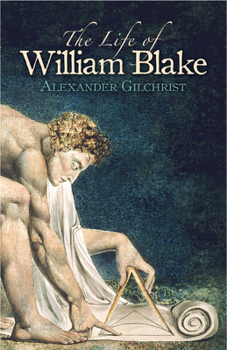The Life of William Blake
Select Format
Select Condition 
Book Overview
First full-length biography (1863) covers Blake's childhood, student years, trial for treason, "madness," neglect by the public, untimely death. Insightful commentary on the poet's works plus 40 of his illustrations.
Format:Paperback
Language:English
ISBN:0486400050
ISBN13:9780486400051
Release Date:May 2017
Publisher:Dover Publications
Length:640 Pages
Weight:1.40 lbs.
Dimensions:1.3" x 5.4" x 8.4"
Customer Reviews
1 rating
Rumor From Another World
Published by Thriftbooks.com User , 20 years ago
Gilchrist had two things going for him as Blake's first biographer. He remains the only one of them all who actually got to talk to people who knew Blake, who were friends with he and his wife. Secondly, he was alert enough to recognize Blake's genius despite the neglect with which it continued to be treated even as Gilchrist wrote the book. Just as Harold Bloom suggests that Emerson proved his own genius by being the first to recognize Whitman's, the same ought to be said of Gilchrist. Throughout Gilchrist's account, he cites conversations and letters exchanged with various friends of Blake, from Samuel Palmer to Crabb Robinson and others. Palmer serves up a gorgeous and sensitive portrait of Blake in a letter to Gilchrist, while Gilchrist's copious quoting of Robinson's talks with Blake are ceaselessly fascinating. To read this first of countless Blake biographies before one of the more recent ones is to strap yourself into a time machine and launch from one world to entirely another. Writing in the 1860s, Gilchrist's language reflects just how jaded we've become over time. Full of purple but no less delightful prose, Gilchrist's often adoring book stops at nothing to ensure the sanctity of his subject. One of Blake's early and comparatively minor "Song" poems from the "Poetical Sketches" is described as possessing "shy evanescent tints and aroma as of pressed rose-leaves." Yet for all the book's haughtiness, it is Gilchrist's fascinating renunciation of criticism that most distinguishes him from we post-moderns: "Criticism is idle. How analyze a violet's perfume, or dissect the bloom on a butterfly's wing?" It would be a long way to Freud, Brooks, Frye, Vendler and Bloom. While Gilchrist often goes to boring lengths in describing Blake's paintings and engravings (as in the tedious "Supplementary" chapter at the end), it is a good thing he did decide to lay off the criticism, as Gilchrist often reveals a complete and astonishing inability to fathom so much of Blake's work. He repeatedly surrenders to the abstractness of Blake's epics, condemning Jerusalem's language as "words empty of meaning to all but him who uttered them" and says of Blake's "Milton" that "few are the readers who will ever penetrate beyond the first page or two." But it is the book's charm that designates it a literary monument. "Fully to appreciate the poetry as the lad Blake composed in the years 1768-77. let us call to mind the dates at which first peeped above the horizon the cardinal lights which people our modern poetic heavens," Gilchrist carries on at the book's onset. The author often blurs the line between eloquence and coherence early on, but soon, as if the immensity of Gilchrist's project gradually wore him down, the book assumes a far more pedestrian tone and becomes all the more wrenching a read because of it. The book's most powerful moment comes in a chapter called "Personal Details" which, if you can sift through Gilchrist's romantic elabora





